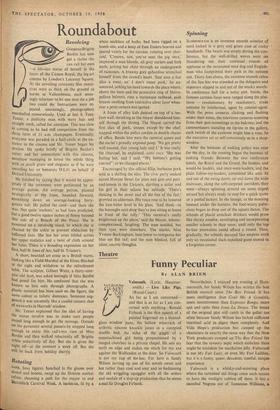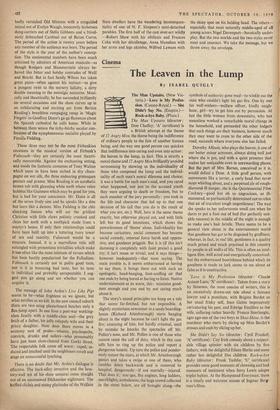Theatre
Funny Peculiar
By ALAN BRIEN Valmouth. (Lyric, Hammer- smith.) — Live Like Pigs. (Royal Court.) As far as I am concerned— and that is as far as I am con- cerned with anything—Ronald Firbank is the thin squeak of a painted fingernail on a stained- glass window pane, the hollow wisecrack of arthritic epicene knuckle joints in a canopied double bed, the echo of the giggle of a moustachioed girl being propositioned by a rouged choirboy in a private chapel. He sets my teeth on edge and makes me reach for my axe against the Wolfenden at the door. So Valmouth is not my cup of tee-hee. For here is Sandy Wilson serving up one of his novels sweet and hot rather than cool and sour and so bedizening the old wriggling squiggler with all the orders and medals of a slap-up production that he seems a real Sir Douglas Firbank. Nevertheless, I enjoyed my evening at Ham- mersmith, for Sandy Wilson has written the best British musical since The Boy Friend. It has more intelligence than Grab Me A Gondola, more inventiveness than Expresso Bongo, more spit and spite than Irma La Douce. The bones of the original plot still catch in the gullet too often because Sandy Wilson has lacked sufficient intestinal acid to digest them completely. And Vida Hope's production has camped up the characters in exactly the same way that the New York producers camped up The Boy Friend for fear that the savoury aspic which embalms them might be mistaken for saccharine jelly. Valmouth is not. My Fair Lady, or even My Fair Laddies, but it is a funny, queer, decadent, tuneful, unique experience.
Valmouth is a whisky-and-watering place where the tarnished old things come each season to have the verdigris rubbed off them. It has a cannibal Negress out of Tennessee Williams, a badly varnished Old Mistress with a misguided missal out of Evelyn Waugh, innocently lecherous dung-carriers out of Stella Gibbons and a frivol- ously debauched Cardinal out of Baron Corvo. The period of the action is twenty years before any member of the audience was born. The period of the style is the year of the author's concep- tion. The sentimental numbers have been much criticised by admirers of American musicals—as though Rodgers and Hammerstein always be- haved like bitter and bolshy comrades of Weill and Brecht. But in fact Sandy Wilson has taken great pains—often against his instinct—to give a pungent twist to the nursery lullaby, a dirty double meaning to the nostalgic nocturne. Musi- cally and theatrically, he has succeeded brilliantly on several occasions and the show curves up in an exhilarating and exciting arc from Bertice Reading's breathless rampaging romp in 'Magic Fingers' to Geoffrey Dunn's ga-ga flamenco about the Spanish cathedral he calls home. While in between them weave the itchy-bitchy secular con- fessions of the nymphomaniac socialite played by , Fenella Fielding.
These three may not be the most Firbankian creations in the musical version of Firbank's Valmouth—they are certainly the most theatri- cally memorable. Against the enchanting setting, and inside the fantastic costumes of Tony Walton which seem to have been etched in dry cham- pagne on wet silk, the three endearing grotesques posture and prance. Miss Reading is an acrobatic brown tub with gleaming white teeth whose voice bubbles like Guinness which may be good for you, but is bad for your conscience. Mr. Dunn is all of the seven lively sins and he speaks like a don but leers like a demon. Miss Fielding is the chic shocking lioness who will eat the grisliest Christian with little claws politely crooked and clean her teeth with a toothpick made from a martyr's bones. If only their relationships could have been built up into a tottering ivory tower of sex and sanctity, Valmouth would be a treasure. Instead, it is a marvellous relic still entangled with pretentious trivialities which make it too often like the most intimate of revues which has been hastily popularised for the Palladium.
Valmouth is certainly not in polite good taste, nor is it in bouncing bad taste, but its taste is individual and probably unrepeatable. I sug- gest you go along and see whether you can acquire it.
The message of John Arden's Live Like Pigs seems to be—what frightens us we ignore, but what terrifies us we kill. In the new council suburb ' there are two smug plasterboard hutches only a flea-jump apart. In one lives a post-war working- class family with a middle-class soul—the grey letch of a father, his jolly rolypoly wife and their prissy daughter. Next door there moves in a scummy nest of proles—whores, psychopaths, convicts, drunks and sailors—who presumably have just been slum-cleared from Gorki Street. The respectable folk come off worst : raped, se- duced and insulted until the neighbours revolt and stage an unsuccessful lynching.
There is no doubt that. Mr. Arden's dialogue is effective. The back-alley invective and the lava- tory-wall wit of his slum samurai come straight out of an uncensored Dickensian nightmare. The baffled clichés and matey platitudes of the Welfare State dwellers have the wandering inconsequen- tiality of one of N. F. Simpson's semi-detached parables. The first half of the cast over-act wildly —Robert Shaw with his sibilants and Frances Cuka with her décolletage, Anna Manahan with her arms and legs akimbo, Wilfred Lawson with the shiny spot on his balding head. The others— especially that most naturally middle-aged of all young actors Nigel Davenport—heroically under- play. But the two worlds and the two styles never meet and intersect. We take the message, but we throw away the envelope.



































 Previous page
Previous page